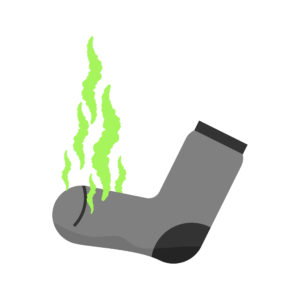 Similar to bad breath, having smelly feet can leave a person feeling self conscious when they are around others. The fact of the matter is that millions of people suffer from mild to severe foot odor, and the good news is that the condition is treatable. However, like most medical conditions, there’s no one-size-fits-all solution to treating smelly feet. Below, we take a closer look at what causes foot odor and how to have the problem diagnosed and treated.
Similar to bad breath, having smelly feet can leave a person feeling self conscious when they are around others. The fact of the matter is that millions of people suffer from mild to severe foot odor, and the good news is that the condition is treatable. However, like most medical conditions, there’s no one-size-fits-all solution to treating smelly feet. Below, we take a closer look at what causes foot odor and how to have the problem diagnosed and treated.
What Causes Foot Odor?
Did you know that you actually have more sweat glands in your feet than in your armpits? It’s true! Your feet can easily produce more than a pint of sweat each day, and that can play a role in your foot odor, but oftentimes there’s more to it than just sweat.
Bromodosis is the medical term for smelly feet, and the condition is actually caused by the bacteria that live on your feet. These bacteria, when combined with sweat, produce what’s known as isovaleric acid, and it’s this acid that contributes to stinky feet. Other less common conditions that lead to smelly feet include:
- Athlete’s Foot (A fungal infection)
- Pitted Keratolysis (When bacteria affects the skin on your feet)
- Medications
- Poor Hygiene
However, the most common cause is from the production of isovaleric acid. Every person experiences this reaction, and while some may have more pungent acid production, the problem can typically be treated by taking a closer look at your footwear and your overall shoe hygiene.
Treating Smelly Feet
Whether you have very sweaty feet or don’t sweat that often, it’s less about sweat production and more about sweat ventilation that contributes to smelly feet. Bacteria need a warm and moist environment to thrive, so if you’re spending long hours in the same shoes day after day, this home for your foot may not be able to vent and dry all that easily. If your shoes are still damp from the day before, which is somewhat common in people who work on their feet all day, your feet are going to be in an environment where isovaleric can be produced quite easily. Look for a more breathable shoe option.
Even if your shoes are dry every time you put your feet in them, take a look at your socks every time you take your shoes off. Are they a little damp? If so, you’ve just been giving bacteria all it needs to feast on sweat and produce isovaleric acid. So what can you do to prevent this? The main idea is to try to keep your feet dry at all times, but other tips include:
- Finding more breathable shoes
- Avoiding wearing the same tight shoes every day
- Changing your socks if they are damp
- Taking off your socks so your feet can breathe more easily at home
- Switch to moisture-wicking socks over nylon options that can trap sweat
- Consider an antiperspirant for your feet
Many people find relief or at least a reduction in their foot odor by following the above tips, and we’re confident you can too. For more hands-on help with this or any other foot issue, reach out to Dr. Silverman’s office today.